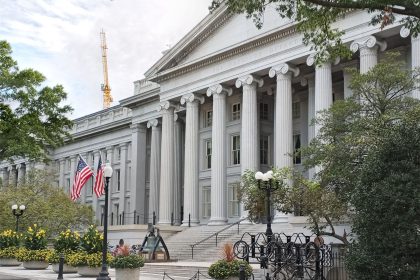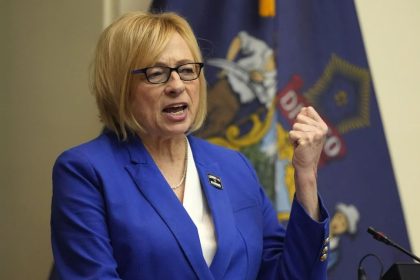If Trump Runs, He’ll Face Multiple Legal Challenges as ‘Insurrectionist’

WASHINGTON — If former President Donald Trump actually runs for president in 2024, he’ll face a concerted multistate effort to brand him an insurrectionist and have him tossed off the ballot, an attorney for Free Speech for People said Friday.
Ron Fein was the lead attorney this past year in a voter-driven effort to get Republican Reps. Madison Cawthorn and Marjorie Taylor Greene tossed off their respective reelection ballots due to alleged “insurrectionist” activities they engaged before, during and after the siege on the U.S. Capitol on Jan. 6, 2021.
Speaking to The Well News on Friday, Fein said he and his legal team have “already committed … that if he declares his intention to run, we will file multiple challenges to his candidacy in different states.”
Fein wouldn’t commit to a number for the lawsuits that will be filed, but said he thinks the case against Trump is “far stronger” than the legal challenges brought against Greene and Cawthorn.
“That is because Trump is as involved in the insurrection as anyone, he is not a peripheral figure by any means,” Fein said, adding, “Of course the House Jan. 6 Committee unearthed more evidence than we knew of … but the thing that’s always been clear, from Jan. 6 and the days right afterward, was that Trump’s involvement was absolutely central.
“If this all came to pass, meaning if he chose to run, we would come in with a very strong factual presentation, and of course, we’re now on very solid ground with the legal arguments because of the precedent that we set in these [earlier] cases,” he said.
In mounting their challenge to Cawthorn and Greene’s candidacies, the voters backed by Free Speech for People, a left-of-center advocacy group, cited § 3 of the 14th Amendment.
The section states that no elected official can ever again hold office if, after having taken the oath to protect and defend the Constitution of the United States, they engage in an insurrection or rebellion against the same or give aid and comfort to the enemies thereof.
The section was enacted in the aftermath of the Civil War, and, according to the Congressional Research Service, “may be applicable to modern times as well.”
Cawthorn lost to a primary challenger before his case was settled, but Greene actually had a hearing before an administrative court judge.
But before this happened, Green filed a federal lawsuit asking the court to bar state officials and judges from adjudicating the voter’s challenge to her eligibility. A federal judge denied her request for a preliminary injunction.
This led to an extraordinary day of testimony from Greene, testimony that ultimately led the administrative law judge to conclude the voters failed to present sufficient evidence to have her removed from the ballot.
Georgia Secretary of State Brad Raffensperger later adopted the judge’s conclusion.
At this point, the state and federal legal actions were playing out in parallel.
The voters asked the Fulton County Superior Court in Georgia to review Raffensperger’s decision, which it eventually upheld. The Supreme Court of Georgia later refused to take the case.
And while the case was ongoing, Greene appealed the federal court’s refusal to grant her injunctive relief to the 11th U.S. Circuit Court of Appeals.
On Thursday, the 11th Circuit remanded the case back to the federal court, ordering it to declare the case moot as the state proceedings had already concluded.
Though the ins and outs of the intertwined federal and state cases can be confusing, Fein insisted they amount to a win for his clients and Free Speech for People.
“This was the second time that we filed a state-based challenge to a candidacy under § 3 of the 14th Amendment, and the second time that a candidate ran to the federal court and tried to block it,” he said.
“The first was Madison Cawthorn. We filed a challenge against him before the North Carolina State Board of Elections, which was ready to hold a hearing when he got a temporary injunction from a federal judge,” Fein explained.
“That federal judge was then overruled by the 4th U.S. Circuit Court of Appeals, who said the reasons advanced for blocking the proceeding were not sufficient enough to warrant a temporary injunction,” he said.
Eventually the Cawthorn case was mooted by his loss in the primary.
That left Greene’s case in play, and Fein noted, she didn’t even get as far as Cawthorn did because the federal court refused to block the state proceeding.
“Now, because the appellate court refused to disturb that ruling, the district court’s decision stands as the last word on the case,” he said. “When you put these two narratives together, what they say is that there is no basis for blocking states from hearing these challenges.”
Though Fein is glad to have these appellate decisions in his pocket, he conceded that as of now, they only apply in the 4th and 11th Circuits, and that it’s entirely possible that a court in another part of the country may sharply disagree with these decisions, potentially setting up a split in the circuits that the Supreme Court would have to resolve.
“That said, this has now been tried in two different federal circuits and both times the appellate court has refused to take up the invitation to block the state proceeding – to me that suggests that there’s a trend … and that it is good precedent.”
Asked if he foresees having to go before the Supreme Court, Fein allowed that it is a distinct possibility.
“I mean, it probably depends on what the state’s ultimate ruling was … if a state court found that a candidate was barred from appearing on the ballot on the basis of their having engaged in an insurrection against the United States, I could definitely see that candidate trying to bring it to the Supreme Court,” he said.
Which brought the subject back around to Greene and the fact that, after a legal challenge, multiple lawsuits and a daylong hearing at which she testified, she’s still on the ballot on Tuesday and will likely, if the polls are correct, be reelected by a wide margin.
Could that be interpreted as a failure, Fein was asked.
“Well, we did not persuade the judge that there was enough evidence that she had engaged in insurrection, that is true,” the attorney said.
“But at the same time, in his written opinion, he agreed with us on a number of legal points that actually set precedent for future challenges,” he said. “For example, she had argued that in order to have engaged in insurrection, you needed to have been convicted of a crime stemming from those acts … in other words that you would have to be criminally convicted of taking part in an insurrection before you could be disqualified.
“The judge rejected that argument. She then argued that the term ‘engage’ required more or less that you were bearing arms and that you were actually involved in shooting or whatever. The judge rejected that as well,” Fein continued.
“Greene also argued that someone whose involvement was primarily through speech and communications could not be found to have engaged in insurrection. And the judge disagreed with that.
“He said while not all speech would constitute engagement and interaction in an insurrection, some words certainly could, and he specifically cited issuing marching orders or instructions to capture a particular objective. And those parts of his ruling, I think, are particularly relevant when you think about Donald Trump because that’s exactly what he did.”
Fein said though he couldn’t comment on the timing of the filing of lawsuits after Trump launched a campaign, he said it wouldn’t be a case of Trump making an announcement and a lawsuit being filed the very next day.
“Trump just getting on a stage and saying, ‘I plan to run for president,’ doesn’t necessarily do anything in terms of state law. The actual timing of these cases will largely be dictated by state balloting frameworks and those are different in every state.
“In some cases, a candidate has to file papers to appear on the ballot. In some cases, the secretaries of state make a designation by a certain date as to who they think are the nationally recognized candidates. So our individual filings would be dictated by timelines in particular states under their state law,” Fein said.
Dan can be reached at [email protected] and at https://twitter.com/DanMcCue.























